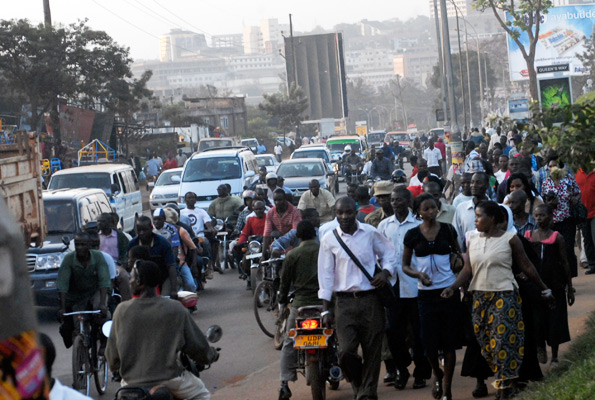I need to start a section on this blog called “ Heard on the show”. I am back to doing analysis on 933 KFM. Today’s show, hosted by Bernard Tabaire (the regular host Charles Mwanguhya is on leave) was about the series of “strikes” that have sprung out of the woodwork that is Uganda’s post election politics. The latest is that teachers have given the government an ultimatum to increase their salaries or else. Before this were the traders and then taxi drivers. On the horizon may be other groups maybe health workers.
The show today featured economist Dr. Fred Muhumuza who is an advisor to the Minister of Finance. He was joined by UPC strong woman (now with the FDC), possibly the only woman of her caliber left in politics- Celicia Ogwal (Woman MP Dokolo). The show had the usual sparks but what really was emerging as a central question at my urging is whether or not Uganda’s economic woes required European style austerity measures.
Its my view that Uganda does need austerity measures and Muhumuza made the argument with the massive electricity subsidy the government offers to keep the service attractive. “ It started with 92 billion about 5 years ago” he says adding that the Ministry of Finance now needs almost 150 billion or more, no thanks to the rising cost of petroleum products. Uganda increasingly relies on thermal power and made the mistake years ago of contracting a huge portion to light diesel fuel.
The current load shedding is the result of the shut down of Aggreko plants, which use light diesel engines. My response of course is that the government subsidy should have gone into rehabilitating the national grid whose congestion in greater Kampala is the source of much of the leakage (this could save about 40% of the power produced). The second option will be to redirect Uganda’s new oil to Heavy Fuel Oil plants as an emergency project.
Regardless Muhumuza proposes something I discussed with friends outside the studio. He says correcting Uganda’s economic woes will not be possible without cutting public administration expenditure. Uganda’s bloated public sector is the main drag on the economy. It’s a non-productive sector that bleeds the treasury through corruption and other redundancies. Its however a major source of government support structures- the “neo-patrimonialism” that forms the populist nerve centers of the ruling party’s support according to government critics.
This of course poses a problem. In this democratic era, can the government of the day talk austerity and engage in deep spending cuts in public administration- a source of its support? This was done through “structural adjustment” Muhumuza responds.
Yes in the good old days of the Movement system. It’s a whole new ball game. Strikes will likely continue but I doubt open talk of austerity measures will be heard anytime soon.










